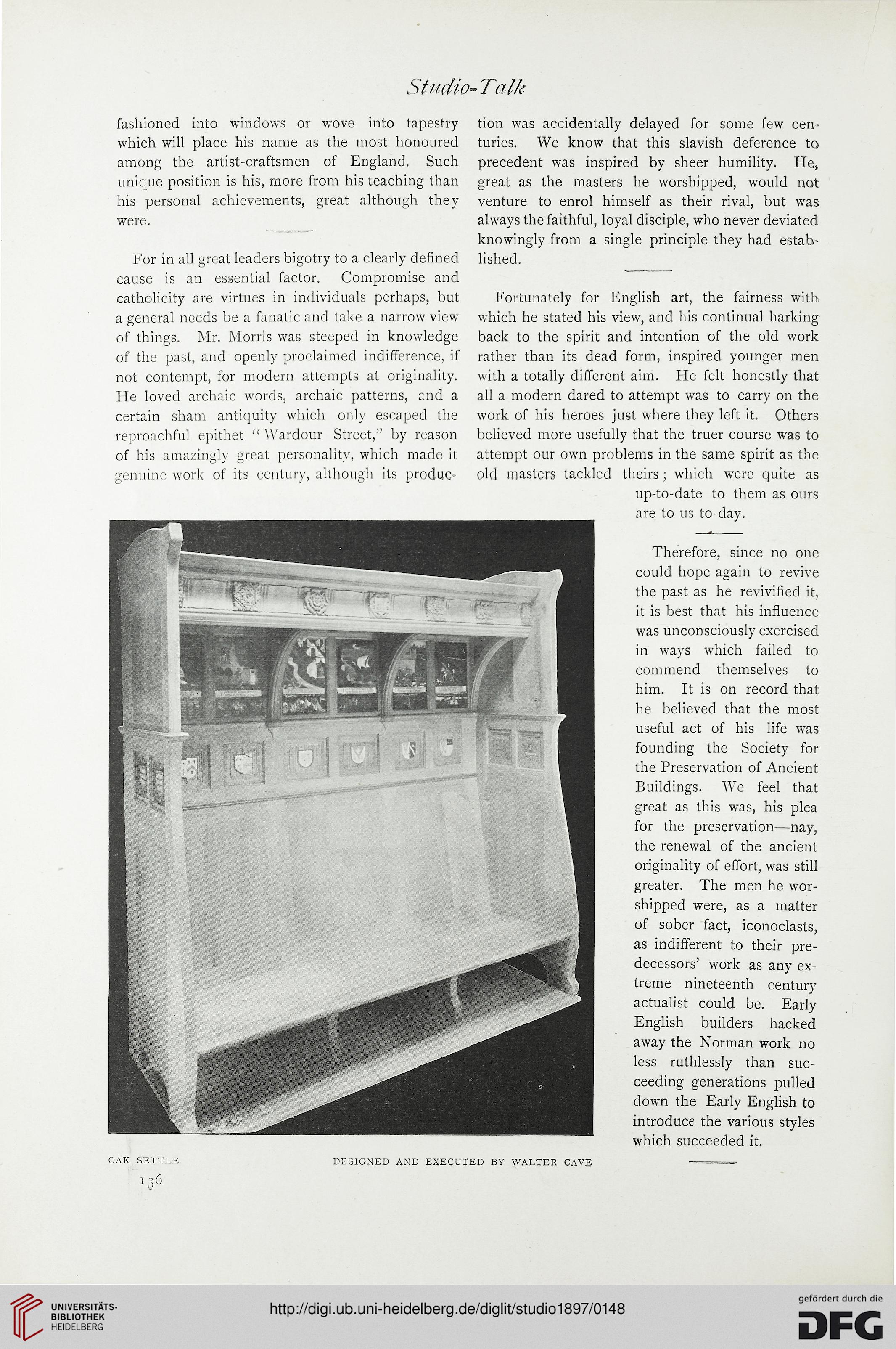Studio-Talk
fashioned into windows or wove into tapestry tion was accidentally delayed for some few cen-
which will place his name as the most honoured turies. We know that this slavish deference to
among the artist-craftsmen of England. Such precedent was inspired by sheer humility. He,
unique position is his, more from his teaching than great as the masters he worshipped, would not
his personal achievements, great although they venture to enrol himself as their rival, but was
were. always the faithful, loyal disciple, who never deviated
knowingly from a single principle they had estah-
For in all great leaders bigotry to a clearly defined lished.
cause is an essential factor. Compromise and
catholicity are virtues in individuals perhaps, but Fortunately for English art, the fairness with
a general needs be a fanatic and take a narrow view which he stated his view, and his continual harking
of things. Mr. Morris was steeped in knowledge back to the spirit and intention of the old work
of the past, and openly proclaimed indifference, if rather than its dead form, inspired younger men
not contempt, for modern attempts at originality, with a totally different aim. He felt honestly that
He loved archaic words, archaic patterns, and a all a modern dared to attempt was to carry on the
certain sham antiquity which only escaped the work of his heroes just where they left it. Others
reproachful epithet " Wardour Street," by reason believed more usefully that the truer course was to
of his amazingly great personality, which made it attempt our own problems in the same spirit as the
genuine work of its century, although its produc- old masters tackled theirs; which were quite as
up-to-date to them as ours
are to us to-day.
Therefore, since no one
could hope again to revive
the past as he revivified it,
it is best that his influence
was unconsciously exercised
in ways which failed to
commend themselves to
him. It is on record that
he believed that the most
useful act of his life was
founding the Society for
the Preservation of Ancient
Buildings. We feel that
great as this was, his plea
for the preservation—nay,
the renewal of the ancient
originality of effort, was still
greater. The men he wor-
shipped were, as a matter
of sober fact, iconoclasts,
as indifferent to their pre-
decessors' work as any ex-
treme nineteenth century
actualist could be. Early
English builders hacked
away the Norman work no
less ruthlessly than suc-
ceeding generations pulled
down the Early English to
introduce the various styles
which succeeded it.
OAK SETTLE DESIGNED AND EXECUTED BY WALTER CAVE
*36
fashioned into windows or wove into tapestry tion was accidentally delayed for some few cen-
which will place his name as the most honoured turies. We know that this slavish deference to
among the artist-craftsmen of England. Such precedent was inspired by sheer humility. He,
unique position is his, more from his teaching than great as the masters he worshipped, would not
his personal achievements, great although they venture to enrol himself as their rival, but was
were. always the faithful, loyal disciple, who never deviated
knowingly from a single principle they had estah-
For in all great leaders bigotry to a clearly defined lished.
cause is an essential factor. Compromise and
catholicity are virtues in individuals perhaps, but Fortunately for English art, the fairness with
a general needs be a fanatic and take a narrow view which he stated his view, and his continual harking
of things. Mr. Morris was steeped in knowledge back to the spirit and intention of the old work
of the past, and openly proclaimed indifference, if rather than its dead form, inspired younger men
not contempt, for modern attempts at originality, with a totally different aim. He felt honestly that
He loved archaic words, archaic patterns, and a all a modern dared to attempt was to carry on the
certain sham antiquity which only escaped the work of his heroes just where they left it. Others
reproachful epithet " Wardour Street," by reason believed more usefully that the truer course was to
of his amazingly great personality, which made it attempt our own problems in the same spirit as the
genuine work of its century, although its produc- old masters tackled theirs; which were quite as
up-to-date to them as ours
are to us to-day.
Therefore, since no one
could hope again to revive
the past as he revivified it,
it is best that his influence
was unconsciously exercised
in ways which failed to
commend themselves to
him. It is on record that
he believed that the most
useful act of his life was
founding the Society for
the Preservation of Ancient
Buildings. We feel that
great as this was, his plea
for the preservation—nay,
the renewal of the ancient
originality of effort, was still
greater. The men he wor-
shipped were, as a matter
of sober fact, iconoclasts,
as indifferent to their pre-
decessors' work as any ex-
treme nineteenth century
actualist could be. Early
English builders hacked
away the Norman work no
less ruthlessly than suc-
ceeding generations pulled
down the Early English to
introduce the various styles
which succeeded it.
OAK SETTLE DESIGNED AND EXECUTED BY WALTER CAVE
*36




